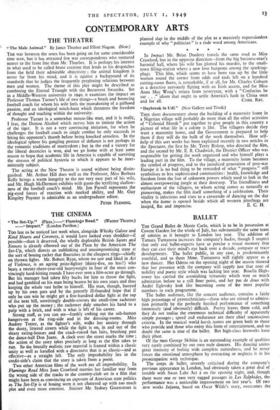THE CINEMA
" The Set-Up." (Plaza.)—" Flamingo Road." (Warner Theatre.) —"Impact." (London Pavilion.) Too late to be noticed last week when, alongside Whisky Galore and Kind Hearts and Coronets, it would have looked even shoddier—if possible—than it deserved, the wholly deplorable British Saints and Sinners is already elbowed out of the Plaza by the American The Set-Up, which directs an unblinking and uncompromising stare at the sort of boxing racket that flourishes in the cheapest rings—chiefly on thrown fights. Mr. Robert Ryan, whom we saw and liked in Act of Violence, is an ageing prize-fighter (thirty-five, no less!) who beats a twenty-three-year-old heavyweight in four of the most con- vincingly hard-hitting rounds I have ever seen a film-actor go through. But his manager had taken fifty bucks for him to throw the fight, and had gambled on his man being beaten by his own years and thus keeping the whole vast bribe to himself. His man, though, buoyed up by his own guts and by the patently ill-founded hope that if only he can win he might get a five-hundred dollar fight at the top of the next bill, unwittingly double-crosses the small-time racketeer who put up the money ; the racketeer duly smashes his hand to a pulp with a brick, and with it what is left of his career. Strong stuff, as you can see—frankly seeking out the sub-human hangers-on at the ring-side and in the dressing-rooms. Miss Audrey Totter, as the fighter's wife, walks her anxiety through the dusty, littered streets while the fight is on, in and out of the sleazy eating-houses and the crack-voiced fun fairs, brushing past the dance-hall Don Juans. A clock over the street marks the time ; the action of the story takes precisely as long as the film takes to run. So the brutally realistic raw material is framed within a classic unity as well as handled with a directness that is as classic—and as effective—as a straight left. The only improbability lies in the credit-title's claim that the story is taken from a poem.
Two other American films of the week are all improbability. In Flamingo Road Miss Joan Crawford marries her familiar way from the wrong side of the tracks to the country-club set in a film that might have been as convincing an exposure of American state politics as The Set-Up is of boxing were it not cluttered up with too much plot and even more emotion. Sinister Mr. Sydney Greenstreet is
planted slap in the middle of the plot as a massively expressionless example of why " politician " is a rude word among Americans.
* * * *
In Impact Mr. Brian Donlevy travels the same road as Miss Crawford, but in the opposite direction—from the big business-man's baronial hall, where his wife has plotted his murder, to the small- town filling-station where a new love burgeons among the sparking- plugs. This film, which seems to have been run up by the little woman round the corner from odds and ends left on a hundred cutting-room floors, is remarkable, if at all, for Mr. Charles Coburn as a detective nervously flirting with an Irish accent, and for Miss Anna May Wong's return from yesteryear, with a "Confucius he say . . ." idiom that ought to settle America's hash in China once






































 Previous page
Previous page